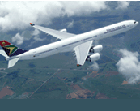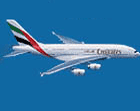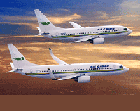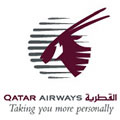|
its
commitment to safety.
Flight News from East
Africa by Prof. Wolfgang Thome
Hot
News from East
Africa
More
Hot News
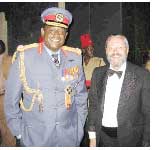
Photo: Profl Thome
(right) with Forest Whitaker
star of movie Last King of Scotland
EMIRATES MOVING TO NEW
TERMINAL 3 IN DUBAI
The Kampala office
of Dubai's global airline has now given out
information, that the airline will move all
operations to the new terminal 3 at Dubai's
International Airport from about mid October this
year. The new terminal is expected to double the
airport's current passenger throughput and the
opening will come into effect over several phases.
This is thought to avoid a repeat of the
disgraceful opening of the new Terminal 5 at
London's Heathrow Airport a few month ago, for
which both BA and the British Airport Authority
came under sustained criticism. Thousands of pieces
of luggage were lost at the time and passengers
messed about to no end, compounding the loss of
popularity of BA from the former 'world's favourite
airline' to 'Best Avoided', as voiced by many
travellers.
Emirates and the
airport management in Dubai are already, according
to the report, training staff and testing systems.
Eventually all Terminal 1 operations of Emirates
will move to the new terminal, concentrating all
the airline's arrivals and departures in the new
facility.
Several more test
runs and trials will be conducted between now and
the expected opening date. Dubai expects to handle
up to 40 million passengers this year and inspite
of the global aviation crisis Emirates seems nearly
immune against the global trend bedevilling the
industry right now. There seems no end in sight of
the boom created by 'Dubai Incorporated', which
started its vision for a transformation of the
Emirate in the late 70's and subsequently saw the
biggest building boom and infrastructural
developments over the past 30 years ever witnessed
in human history.
A
iArport of the Year Rankings
http://www.skytraxsurveys.com/
FLY540
UGANDA BRINGS IN AIRCRAFT
Having
been granted an AOC by the Ugandan Civil Aviation
Authority &endash; an expensive duplication of a
process already in place in Kenya but required by
stubborn regulators still unwilling or unable to
delegate part of their oversight and control
functions to another East African Community member
state CAA &endash; Fly540 has now acquired and put
on the Ugandan registry initially two converted F27
freighters, which will operate out of Entebbe into
the region and provide sufficient capacity to cater
for transit air cargo destined beyond Entebbe.
Often times in the past cargo reached Uganda by air
through European or Middle Eastern airlines on
pallets, but then had to be delivered by truck to
its final destination in Eastern Congo or Southern
Sudan due to lack of adequate palletized or loose
cargo capacity on onwards flights. This problem has
now finally been solved to the relief of air cargo
agents in Entebbe.
News
are also expected on passenger operations
originating from Uganda's main aviation gateway, so
watch this space for breaking news on Fly540's
plans.
BRUSSELS
AIRLINES EXTENDS ETIHAD CODESHARE
Information
was received from SN sources that the main Belgian
airline, of late the newest member in the Lufthansa
family, has extended their codeshare arrangements
with Abu Dhabi's flag carrier Etihad. The Gulf
airline can now offer 'through' tickets for their
four weekly flights to Brussels to connect their
passengers to the Scandinavian capital cities of
Oslo, Copenhagen, Stockholm and Helsinki. All
connecting flights will be operated on Brussels
Airlines equipment.
Brussels
Airlines also confirmed that their tie up with
Lufthansa and eventual entry to Star Alliance, the
world's leading global airline alliance, will have
no affect on their present contracts and long term
cooperation plans with Jet Airways. For the coming
winter season around 20 European destinations
connect Jet Airways passengers within two hours of
landing in Brussels through SN flights, a
substantial increase from the previous schedule.
The cooperation is expected to initially feed some
6.000 passengers a month to Brussels Airlines
flights and these numbers are expected to increase
further by 2009.
AIR
UGANDA NOW GOES DAILY TO JUBA
Information
was received that Air Uganda has upped their
frequencies from 5 per week to daily flights
between Entebbe and Southern Sudan's capital Juba.
Load factors on this particular route show the best
performance within their route network, justifying
the extra flights.
Royal
Daisy Airlines in the meantime is still without
their Embraer 120, which also plied the route with
daily flights but is now undergoing heavy
maintenance with no replacement aircraft in sight
as of going to press. Third contender on the route,
Eagle Air Uganda, reduced their scheduled flights
to three times a week via the Southern Sudanese
town of Yei, basically leaving the profitable Juba
route without serious competition at this time.
Eagle Air however has commenced scheduled
operations to Bunia in Eastern Congo using
Beechcraft 1900B and LET 410 aircraft. Brussels
Airlines has also recently signed an agreement with
Air Uganda to cater for connecting passengers in
Entebbe to and from Juba.
ETHIOPIAN
OFFERS OUAGADOUGOU
Information
received from the ET offices in Kampala indicates
that from end October onwards they will fly six
times a week from Addis to the West African
destination, using a B757 aircraft. The flights
will be routed via Accra and Abuja, although Lome
is also still a possibility for a stopover.
Ethiopian
Airlines, together with Kenya Airways, offer the
most comprehensive inter African networks and are
largely responsible to not only connect Africa
within but also connect Africa to the rest of the
world.
RWANDAIR TO ADD CARGO
SERVICES
The Executive
Chairman of Rwandair earlier in the week confirmed
that Rwanda's national airline is due to establish
a separate cargo operation in a few months time.
The strategic objective of this move will be to
guarantee affordable, regular and dedicated
airfreight capacity to export flowers, fruits and
vegetables to the consumer markets in Europe and
the Middle East, as the present capacity for
palletized cargo is limited to the flights of
Brussels Airlines, and for loose cargo to Kenya
Airways and Ethiopian. It was also confirmed that
negotiations with Lonrho Africa's airline partner
Fly540 are on course and expected to be concluded
soon. This will result in the Rwandan government
selling 49 percent of its stake to Fly540 while a
portion of the remaining shares will then go to
some institutional investors from Rwanda itself, to
retain the required number of shares for the
nationality clauses in international and bilateral
agreements with other countries.
The airline has
also confirmed that they are putting t
DELTA'S NAIROBI FLIGHTS
PUSHED TO 2009
Delta Airlines, a
partner of Kenya Airways through their mutual Sky
Team membership, has now reportedly moved their
intended flights to Nairobi further into the
future. Prior to the post election violence in
Kenya, the inaugural flight was due to have taken
place already, but owing to the market down turn in
the wake of the violence, Delta then decided to
launch a few months later than initially planned.
This however has now, according to aviation sources
in Nairobi, been postponed once more and the launch
of the much expected flights, said to be initially
three a week between a yet to be confirmed gateway
in the US and Nairobi, will now not take place
before some time well into 2009..
AIR TANZANIA FLEET
UPDATE
The two
recently acquired Bombardier Dash 8-300Q have now
commenced service, after having been repainted in
the livery of Tanzania's national airline. The two
aircraft will be deployed from Dar es Salaam on the
routes to Kilimanjaro / Mwanza, Zanzibar, Kigoma,
Mtwara and Dodoma as well as other domestic
destinations. It is also understood that the
Tanzania Government has now issued the guarantee to
the lessor / owners of the new A320, which Air
Tanzania is to receive shortly, fulfilling the last
outstanding contractual element before delivery of
the aircraft. Technical personnel and crew are
already undergoing training and typerating on the
aircraft, ready for delivery and deployment.
Additional aircraft purchases are also at an
advanced stage, underscoring the political will of
the Tanzanian government to keep ATCL independent
from snap up vultures hovering in the region and
operationally capable to strongly compete in the
East African aviation market and beyond. Well done
indeed!
AIR TANZANIA TO PARTNER
WITH CHINESE AIRLINE
As indicated some
time ago in this column, it has now finally been
confirmed that Air Tanzania will indeed invite a
Chinese airline to acquire 49 percent of their
shares and inject much needed extra capital into
the Tanzanian national airline. According to
further information available the China Development
Bank will make loans available for the purchase of
additional new planes in coming months, probably of
both Airbus and Boeing make, to allow the airline
resume traffic on international, continental and
regional routes which it could not serve due to
lack of suitable aircraft. The airline already
operates a recently acquired A320 and two recently
acquired Q300, with two Q400 turboprop aircraft due
to join the fleet in 2009. While this development
means good news for Air Tanzania and Tanzanians and
the country in general other airlines in the region
will have to take a hard look at their own business
strategies, in particular smaller one or two plane
and upstart airlines, to be ready when Air Tanzania
will eventually unleash quality competition on
them.
AIR ZARA JOINS THE
THRONG
A family owned
airline has now reportedly started operations from
Dar es Salaam with a Boeing 737-200, not the best
of credentials these days for an upstart company,
as this type of aircraft &endash; while cheap to
lease or buy &endash; burns substantially more fuel
compared to more modern jets and is more expensive
to maintain. The aircraft is reportedly fitted with
14 business class and 96 economy class seats, again
considered large for the Nairobi route they intend
to fly regularly on scheduled services. The
aircraft will also be available for charters
according to the promoters. The airline
headquarters will be based at the international
airport in Dar es Salaam. Best of luck to the
newcomers, safe landings and time will tell just
how well they will eventually do.
PRECISION AIR DOUBLES
ARUSHA FLIGHTS
In a long awaited
move has Precision Air, Tanzania's premier private
airline, now added a second flight from Dar es
Salaam to Arusha. The airline also announced extra
flights to Zanzibar from Kilimanjaro International
Airport and Dar es Salaam as well as more weekend
flights to Nairobi. As Precision is preparing for
the delivery of a second B737-300 they are now
positioning themselves to aggressively compete in
the market ahead of the expected market entry of
new players and amid the ongoing revival of Air
Tanzania.
KENYA AIRWAYS LAUNCHES
AVIATION TRAINING CENTRE
In a move setting
the Kenyan national carrier further apart from
other airlines in the region, KQ has now opened its
ground breaking aviation training centre. The
facility is reportedly already being used for KQ
staff but is said to go commercial next year.
Courses on offer will cover ticketing, management
skills, supervisory courses and importantly
engineering courses which will be supported by KQ's
own maintenance base facilities at Embakasi. AIR
TANZANIA NEWS UPDATE
A ministerial
statement in parliament this week reaffirmed that
Air Tanzania has indeed started operations to
Dodoma and was about to serve four more domestic
destinations across the country, such as Kigoma,
Tabora, Songea and Shinyanga. The development is
thought to stir up the domestic aviation market
with competition, as ATC could not serve all
domestic routes in past years due to lack of
suitable aircraft. However, recent aircraft
deliveries have turned the trend and the Tanzanian
public will be keen to see improvements in service
delivery and greater choice.
KENYAN LIGHT AIRCRAFT CRASHES
INSIDE SOMALIA
A Kenya registered aircraft,
carrying 'miraa' or 'khat' to Somalia, reportedly
crashed yesterday not far from Mogadishu, while
attempting to land. Early reports from the scene
indicate that there were no survivors and the crew
on board died at the scene. Miraa is a major export
item from Kenya's Meru area and consumed in large
quantities in Somalia. No cause for the accident
was available.
RWANDAIR RESTORING
JOHANNESBURG FLIGHTS
When the Rwandan national
airline returned their ACMI leased B737-500 to Air
Malawi a few months ago, their regular flights
between Kigali and JNB had to be suspended due to
lack of suitable aircraft. However, it was now
learned that the airline has last week concluded a
fresh lease arrangement for a B737-300 which
&endash; once commencing operations &endash; will
allow the resumption of the South Africa flights.
To cover the gap which the returned B737 left in
the fleet, Rwandair then leased a CRJ100ER from
Kenyan airline Jetlink and another Bombardier Dash
8 to maintain at least their regional schedule. The
newly leased B737-300 is due in mid / late
September according to usually well informed
sources. Other contacts within the airline also
confirmed that they were planning to acquire
additional aircraft in coming years to widen their
network.
In confirmation of information
published in this column in recent weeks the
airline's executive chairman also made reference
earlier in the week to the planned cooperation with
Fly540 / Lonrho Aviation, indicating that
negotiations are well near complete and a fully
fledged partnership was now imminent. This will
ultimately result in selling a 49 percent
shareholding to the new investors and constitute a
further stepping stone in establishing Fly540 as a
regional force to reckon with.
It would also appear that the
acrimonious suspension of the code share agreement
between Kenya Airways and Rwandair on the Nairobi
route over the use of the leased CRJ100 may have
put to rest any last opportunity for KQ to step
into the fray after Brussels Airlines failed to
submit the required financial proposals and
effectively dropped their bid for a partnership
with Rwandair two weeks ago.
RWANDAIR
PRIVATISATION REGROUPS
News were received
from usually well informed sources in Rwanda, that
the privatisation exercise was halted when Brussels
Airlines did not submit the required financial
proposals, after coming out on top of the
applicants class. It appears that an Italian
airline's proposal was lacking in substance and
they eventually withdrew their bid, as their sister
airline in Uganda continues to struggle in the face
of adverse market conditions. This left expected
frontrunner Brussels Airlines, but the latest
development probably reflects the hard times
airlines are falling on in the face of exploding
fuel prices and other operational cost increases.
Regrets have already been expressed over this
development, which had raised many hopes and
expectations that SN would establish a stronger
foothold in the East African market.
A new player
however is thought to have positioned itself to
step in to the breach by the names of Fly540. The
Lonrho Africa backed airline, which is already
operating from Kenya into the region and has
recently established a Ugandan operation too, is
thought to have quietly made contact with Rwandair
and there is speculation amongst aviation industry
observers that a partnership with Rwandair or even
an outright participation in the airline as the
government in Kigali was initially seeking, may be
on the drawing board or indeed near. Should indeed
the information be correct it would be good news
for Fly540 as well as for Rwandair, strengthening
cooperation in the region and offering quality
services albeit through a low cost operational
model. Fly540's Uganda operation could upon start
up even commence code shared flights between
Entebbe and Kigali, where only recently Rwandair
upped their once daily service to double
daily.

AVIATION
FRATERNITY SPLIT OVER NEW AIR SERVICE
REGULATIONS
The Kenyan aviation
sector has apparently placed an injunction on the
new regulations, which were developed in recent
years. While sections of the industry appear to
have no issues with the new regulations, mainly the
scheduled airlines, the non-scheduled and charter
operators engaged in safari flying do have major
objections to the new regulations. The Kenya
Association of Air Operators Executive Director
Col. (rtd) Waithaka said: [the regulations
are] 'fundamentally flawed in their current
state and many operators will be affected if they
are gazetted without exceptions.' He pointed out
that once the new regulations are in force, flights
to unmanned upcountry airfields and small air
strips will be all but impossible, which would
impact greatly on the ability to offer countrywide
comprehensive air services.
Aviation
authorities have been obstinate to a degree to
listen to the private sector and employ some common
sense, a rare commodity in those circles, often
hiding behind obscure ICAO regulations for which
however exemptions are possible in particular in
countries where much of the traffic is operated on
VFR and below certain flight levels. Both
communications as well as navigations aids are also
not in line with the more developed countries,
preventing the provision of weather data and strip
conditions to pilots prior to taking off for those
'unmanned' airstrips in parks and elsewhere. This
is one of the prohibitive measures the new
regulations demand and no consideration was given
so far to the justified objections of the affected
air operators. Similar objections were also raised
in Uganda and Tanzania, with one or two of the more
outspoken Ugandan operators calling the regulators
'useless' &endash; in reflection not entirely
justified however, as this correspondent can
attest, having been part of the group developing
the new regulations. It is also noteworthy however
that verbal commitments made by the regulators to
the private sector over dispute resolution have not
taken root as yet, causing the friction between
regulators and the aviators to deepen if not
addressed soon.
Meanwhile EAC
authorities and member states continue to decry the
high cost of air travel without however addressing
the exorbitant regulatory cost and fees levied on
tickets, where the cost of the plain airfare can
easily double to meet the regulatory add-ons.
Memberstates have also placed non tariff barriers
on the aviation sector by demanding unreasonable
duplications of licences and operating permits and
restricting airlines from one country to freely
operate into any airfields or aerodromes in another
memberstate or allow cabotage operations within a
memberstate other than the one where the airline is
registered and licensed.
AIR TANZANIA
LAUNCHES DODOMA SERVICES
The recent arrival
of two new turbo prop aircraft has now allowed
Tanzania's national airline to resume services on
domestic routes, which they could previously not
serve due to equipment restrictions. Dodoma is
Tanzania's political capital &endash; Dar es Salaam
is the commercial capital &endash; and requires
regular air connections between the two cities to
facilitate easy travel of politicians, since many
ministries are in fact located in Dar. At the same
time of the announcement the airline also appointed
a new general sales agent in Dodoma, Antelope
Safaris Ltd., to represent their interests and
facilitate ticket sales and bookings. Flying time
between Dar and Dodoma will take approximately 1 ?
hours on the Bombardier built Q 300. Meanwhile, the
Tanzanian government has expressed its displeasure
over charging certain services in US Dollars,
probably aimed at airlines, travel agencies and
landlords, while the Tanzanian Shilling is the
legal tender in the country. Government sources
were quoted to have vowed to 'stamp out the
practise' which they termed 'illegal' in the face
of market realities.
PRECISION AIR
TRAINS STAFF FOR NEW ATR FLEET
It was reported
during the week that Tanzania's premier private
airline has welcomed back 4 staff who were deployed
over the last year at the ATR factory to train in
aircraft maintenance ahead of the delivery of more
of the advanced turboprop aircraft. The airline is
also sponsoring several more staff for the final
stages in qualifying as ATR pilots, which is a
commendable move looking at the massive cost
involved to reach the stage for commercial flying
on scheduled airlines. Inspite of the start of
global lay off's of pilots due to fleet adjustments
and the retirement of aged jets, there is still a
looming pilot's shortage on the global stage,
thought to worsen over the next years as in
particular Middle Eastern airlines are enticing
qualified pilots to join their growing fleets.
CHANGES AT KENYA
AIRWAYS
IIt was learned
just a fraction too late for last week's column,
that Kenya Airways Commercial Director Hugh Fraser
will be leaving the airline, as will his colleague
Neil Canty, holding the portfolio of Finance
Director. In particular Hugh was enormously
instrumental in the team supporting and surrounding
CEO Titus Naikuni, to build Kenya Airways into the
success story it was prior to the opposition
inspired post election violence, which hit Kenya on
a broad basis and ripped the carpet-s peak business
- from underneath the feet of many leading
companies including KQ. Recent reports filed in
this column already spoke of the problems the
airline was encountering in particular on the
European routes and routes in and out of Mombasa.
Staff have been asked to take paid leave (for the
time being), although no formal lay offs are
presently underway. A strict cost saving and cost
reduction programme is presently being finalised
and implemented to keep Kenya's national airline
financially balanced, until the recovery of the
tourism sector goes underway and passenger numbers
return to normality. However, it is sadly noted
that this recovery will apparently be without Hugh,
whom this correspondent wishes the very best in the
future.
It is also noted
that other senior staff had left the airline over
the past few months (Technical Director and
Director Flight Operations / Chief Pilot), probably
making way for a major top management shake up and
organizational revision, including creating the
position of Chief Operating Officer (COO). The
airline's CEO Titus Naikuni's position is
reportedly however not under review as he continues
to enjoy the ongoing confidence of key shareholders
like Air France / KLM and the Kenya Government. The
airline has been struggling before the Kenya post
election violence started affecting the passenger
and cargo performance, with a huge network and
fleet expansion and related problems, but was
reported to be on the way to getting things on the
straight and narrow once again before the current
crisis began to depress the financial results and
drove the share price to sharply lower
levels.
Hot on the heels of
these changes come further news that the airline
suspended the Paris route for the time being, owing
to a sharp drop in passenger numbers. Passengers
already booked will now connect to Paris via
Amsterdam, where the onward flight is operated in
code share with KLM or via London, where the onward
codeshared flight is operated by Air France. The
route may be restored at a later date, once demand
levels have risen sufficiently again to justify the
service.
 France's
anti travel advisory has been particularly
aggressive, warning off would be travellers with
grave language, but this may change in view of a
political agreement coming nearer and the situation
in Kenya in general stabilising in recent days,
after the opposition goons apparently got the
message from their puppetmasters to stop the
unwarranted attacks on fellow Kenyans. Germany,
Italy and the UK already lifted their anti travel
advice which will be a welcome boost to restore
tourism arrival from these countries to their
per-election levels. France's
anti travel advisory has been particularly
aggressive, warning off would be travellers with
grave language, but this may change in view of a
political agreement coming nearer and the situation
in Kenya in general stabilising in recent days,
after the opposition goons apparently got the
message from their puppetmasters to stop the
unwarranted attacks on fellow Kenyans. Germany,
Italy and the UK already lifted their anti travel
advice which will be a welcome boost to restore
tourism arrival from these countries to their
per-election levels.
Access
to Africa flights via three great oceans. Consider
fam
tours
to Africa via North America's Pacific Gateways with
exotic stopovers in Asia and many carrier options.
Air
Cargo Update
WFS
PROMOTES PABLO GARCIA TO SENIOR VICE PRESIDENT
WORLDWIDE SALES
FLY 540 NOW SET
FOR ENTEBBE
Following shortly
after launching their first regional destination
&endash; Southern Sudan's capital of Juba &endash;
Fly 540 has now started operating their next
regional route to Entebbe, launched earlier this
week with yet little fanfare. The advertised fares
stand at 79 US Dollars one way, plus continuously
high regulatory charges, which the regional
governments now have to address as a matter of
urgency. Bringing airfares down on a broad basis
has to be matched with lower airport taxes and
navigation / landing fees for regional flights to
promote airtravel beyond its present transportation
market share. These regulatory charges presently
cost US Dollars 116 for a return flight, with the
air fare costing USD 158, an unrealistic equation.
The Fly 540 fares are not much different from the
Royal Daisy / African Express fares of USD 70 one
way plus regulatory charges, mentioned some time
ago in this column as breaking news, but are
substantially lower compared with other airlines on
the route. In addition Fly 540 operates 2 daily
flights while African Express operates only twice a
week and may therefore not stand the pace of the
new competition.
This will be a
welcome development for travellers and is aimed
towards the AKFED owned Air Uganda, which was
licensed by the Uganda Government in November 2006
with the understanding that fares between Kenya and
Uganda would come down on a broad basis. Not only
did the upstart fail and subvert this expectation
but also introduced two aviation stone age, first
generation DC 9's as their start up aircraft, one
of which will this weekend be substituted with what
they say ' a newer' aircraft, this being a nearly
20 year old MD 87. Environmental concerns obviously
do not feature at all in this outfit and regulatory
demands therefore must be hastened to compel such
companies to comply with global standards of
emission controls. This is of particular
significance in view of AKFED's corporate song of
'best practise', which alter ego may now have to be
looked at afresh by the green lobby and real
conservationists to establish its true global
carbon footprint and industrial emissions caused in
the developing world.
Fly 540 is starting
on the route with ATR 42 equipment with 48 economy
seats, and having several brand new ATR's on order
from the French manufacturer will undoubtedly put
Fly 540 into an excellent position as far as
operational cost are concerned. The route will see
the new ATR 72 introduced soon, which will then
operate with 12 business class and 50 economy class
seats, reflecting anticipated market demand for
services on the heavily travelled route.
There will, for the
time being, be two daily flights between Nairobi
and Entebbe, offering the important and convenient
first connection out of Nairobi to Entebbe at 06.40
hrs, as well as a late afternoon flight, which will
allow travellers from Kenya to spend a full working
day in Uganda and be home in Nairobi the same day
again. Fly 540's biggest single investor is Lonrho
Africa, which also intends to launch air operations
in several other African countries during 2008 and
2009 as a credible regional alternative, going by
recent press statements issued by the company. In
fact, travel agents during this week's Skal
function in Kampala expressed delight with Fly
540's start in Uganda and were hopeful the airline
could soon add further flights, which in their
combined view were offering the best value for
money in the market.
RWANDAIR
PRIVATIZATION STILL PENDING
While a request for
comments from the airline was not responded to it
could nevertheless be established, that the
exercise has not been concluded in January, as was
widely expected. Informed sources confirmed under
cover of anonymity, that Rwandair's review of the
proposals took in particular issue with the types
of aircraft floated by the two remaining bidders.
Meridiana, an airline based in Italy, had proposed
to introduce some of their own aged MD 87 series,
but Rwandair had disposed of a similar model some
time ago due to the cost of operation of this
particular aircraft type in favour of a Boeing
737-500. There is also negative perception in the
region about such 'investors' bringing old
equipment and peddling it as 'state of the art' as
does the travel market not appreciate the use of
old aircraft, when regional giant Kenya Airways has
a truly modern fleet in operation.
Brussels Airlines
too ran into predictable questions when they
initially offered to use the BAe 146, which the
airline is progressively retiring from the European
fleet. Again, this particular aircraft type is not
considered suitable to the climatic operating
conditions and elevations across Eastern Africa,
nor would it allow non stop flights from Kigali to
Johannesburg.
A decision is now
expected in coming weeks, after updated proposals
are being reviewed at present, though no precise
timeframe is available from the airline. Meanwhile,
application deadlines for several advertised
positions for personnel were extended this week to
allow for more applications to be submitted to the
airline's offices in Kigali, Entebbe, Kilimanjaro,
Bujumbura, Johannesburg and Nairobi.
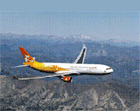 AFRICAN
AIRLINES DOUBLE ORDERS FOR NEW AIRCRAFT AFRICAN
AIRLINES DOUBLE ORDERS FOR NEW AIRCRAFT
by Prof. Wolfgang Thome
AFRAA, the association of African airlines, has
just released information that member airlines on
the African continent have during 2007 ordered over
150 new aircraft, up from only 84 new aircraft
ordered in 2006. The trend to modern equipment will
continue in 2008 according to forecasts, with the
key continental players setting the standards other
airlines are likely to follow. In stark contrast
the latest Ugandan upstart is using first
generation DC 9-32 - aptly termed 'sky howlers' by
a Ugandan aviation veteran - which spew fumes and
leave very audible noise prints across the East
African landscapes. Fuel savings generated by the
latest engine types and stricter environmental
controls (and categorical demands by governments in
international destinations) have pushed the leading
African airlines towards modern state of the art
jets and their rising passenger numbers also
confirm that the market is keen to see their
airlines fly the latest type aircraft - not to
mention safety considerations.
The leading
airlines in Africa have also, with the notable
exception of Ethiopian Airlines, now chosen
alliance partners, which has a further impact on
marketability of their services. South African and
Egypt Air are now flying with 'Star Alliance' while
Kenya Airways in 2007 joined the Air France / KLM
led 'SkyTeam', which will leave smaller airlines
without IOSA certification and operating with
internationally shunned old aircraft, trailing in
their wake.
Read
Prof. Thome's regular news update on the entire
East Africa sector. Details.
More
Airways News
. Air
Highways Website
. Air
Safaris. We're in Google's Top 3
Did
You Know?
In
1995 our team launched Air Highways Magazine and
followe d
up with Air Highway Days, a conference to showcase
member airports and communities to the travel
industry. Several years later we staged and even
bigger show in Vancouver, the Air and Marine
Tourism Conference. Good fortune continued to smile
on us that same year when, in partnership with the
Africa Travel Association, we introduced Africa
Travel Magazine. It's 4,000 page web site now leads
the pack in many search categories. Continued .
See: http://www.airhighways.com d
up with Air Highway Days, a conference to showcase
member airports and communities to the travel
industry. Several years later we staged and even
bigger show in Vancouver, the Air and Marine
Tourism Conference. Good fortune continued to smile
on us that same year when, in partnership with the
Africa Travel Association, we introduced Africa
Travel Magazine. It's 4,000 page web site now leads
the pack in many search categories. Continued .
See: http://www.airhighways.com
|

![]()
![]()
![]()


 France's
anti travel advisory has been particularly
aggressive, warning off would be travellers with
grave language, but this may change in view of a
political agreement coming nearer and the situation
in Kenya in general stabilising in recent days,
after the opposition goons apparently got the
message from their puppetmasters to stop the
unwarranted attacks on fellow Kenyans. Germany,
Italy and the UK already lifted their anti travel
advice which will be a welcome boost to restore
tourism arrival from these countries to their
per-election levels.
France's
anti travel advisory has been particularly
aggressive, warning off would be travellers with
grave language, but this may change in view of a
political agreement coming nearer and the situation
in Kenya in general stabilising in recent days,
after the opposition goons apparently got the
message from their puppetmasters to stop the
unwarranted attacks on fellow Kenyans. Germany,
Italy and the UK already lifted their anti travel
advice which will be a welcome boost to restore
tourism arrival from these countries to their
per-election levels. AFRICAN
AIRLINES DOUBLE ORDERS FOR NEW AIRCRAFT
AFRICAN
AIRLINES DOUBLE ORDERS FOR NEW AIRCRAFT d
up with Air Highway Days, a conference to showcase
member airports and communities to the travel
industry. Several years later we staged and even
bigger show in Vancouver, the Air and Marine
Tourism Conference. Good fortune continued to smile
on us that same year when, in partnership with the
Africa Travel Association, we introduced Africa
Travel Magazine. It's 4,000 page web site now leads
the pack in many search categories. Continued .
See: http://www.airhighways.com
d
up with Air Highway Days, a conference to showcase
member airports and communities to the travel
industry. Several years later we staged and even
bigger show in Vancouver, the Air and Marine
Tourism Conference. Good fortune continued to smile
on us that same year when, in partnership with the
Africa Travel Association, we introduced Africa
Travel Magazine. It's 4,000 page web site now leads
the pack in many search categories. Continued .
See: http://www.airhighways.com
![]()


